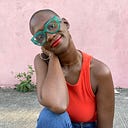Can Hostels Be Safe Spaces for Black Travelers?
The possibility of emotional harm may not make them worth it.
--
This summer, I hadn’t spent any time in a hostel environment because I decided to treat myself and spend three months in my own private villa in Bali.
As my time came to an end, the same nerves re-visited me as the year prior when I lived a semi-private life with a host family in Vietnam.
Then too, as I prepped to re-enter the backpacking space, thoughts on my ability to deal with, or even want to deal with, the racial violence and microaggressions I’d come to associate with the hostel space.
My anxiety makes its presence felt with a nagging thump in my chest and twisty fear in my belly at the thought of most social settings.
But after some negative experiences in hostels throughout Southeast Asia and India, it has been a balancing act of telling my anxiety to stand down and actually listening to what it’s trying to protect me from.
For a long time, hostels got a bad rap because of the seediness shown in the media, including the horror movie Hostel.
I, for one, never thought I would have slept in over seventy-plus hostels to date based on my germaphobe tendencies, but they have their advantages.
They’re affordable, a great way to meet people, and to get the inside scoop on a country and its surroundings. However, as my travel journey continues, my luster for hostels is quickly fading.
As a black woman, I’ve come to feel emotionally unsafe when staying in hostels. Not all the time, but more times than I or any other black traveler should have to experience.
Safe spaces are places and spaces where marginalized groups — women, LGBTQ+, people of color, black people, and people with disabilities are free to be themselves, without experiencing physical or emotional harm.
In my experience, the majority of guests staying in hostels are white travelers, and the ones dishing out microaggressions and dangerous racist rhetoric.
I have sat through, overheard, and removed myself from some very ugly conversations while in hostels.
Not only has my travel journey taught me about different cultures and granted me new experiences, but I’ve also had to learn to navigate racism from white travelers in a way I didn’t expect on the road.
In New York, yes, but in Asia, a continent that is inhabited by people of color, no.
A few weeks back, I stayed in a hostel for two nights in Canggu, Bali, before my scheduled departure flight.
I had woken up pretty early one morning and was just chillin’ in bed while some guests were out in the common area playing pool and listening to music.
As Chris Brown’s “Loyal” bumped, I couldn’t do anything but hold my breath, and brace myself for the inevitable.
“When a rich nigga want you
And your nigga can’t do nothing for ya
These hoes ain’t loyal
These hoes ain’t loyal
Yeah, yeah, let me see.”
They did exactly what I expected and repeated every word of the chorus, including the one word that is off-limits to anyone that is not black.
What was so triggering about that experience is the real emphasis that was used in saying the N-word. They fumbled over the words of the song, including the chorus, but the word ni**a was fully enunciated and just flowed off their tongues.
As the rage ripped through my bones, I thought about my choices, I came to the conclusion that I had three.
Go out into the common area and sit on the couch, making my presence felt, give a mini-lesson on how them saying that word causes me emotional harm, or three, put my noise cancellation headphones on and ignore.
I chose the latter.
With either choice, I would have experienced psychological trauma.
I experienced it the moment the N-word left their mouths.
In Audre Lorde’s Sister Outsider: Essays and Speeches she says:
“Black and Third World people are expected to educate white people as to our humanity. Women are expected to educate men. Lesbians and gay men are expected to educate the heterosexual world. The oppressors maintain their position and evade their responsibility for their own actions. There is a constant drain of energy which might be better used in redefining ourselves and devising realistic scenarios for altering the present and constructing the future.”
I chose to ignore but really what I chose was my self-preservation. I chose to keep my energy and use it to get back into a mentally safe space.
Can hostels be safe spaces for black travelers?
I believe it depends on the day and who happens to be at the hostel at the same time, which is out of our control.
Most importantly, if black travelers find themselves in hostels where they are experiencing microaggressions or racial violence, they should never be ashamed of packing their shit up and finding a new hostel.
I’ve done it plenty of times, and every time I’ve chosen my well-being over saving face, I was never disappointed and always ended up being where I needed to be.
Trust your intuition, its there for a reason.
